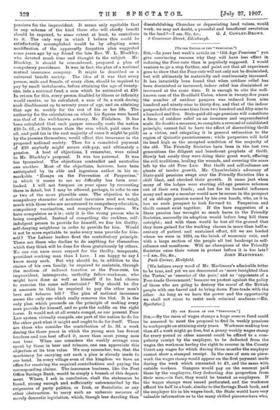(TO TRY EDITOR Op THE "SPECTATOR."] Sr,—In your last week's
article on "Old-Age Pensions" you give convincing reasons why they will have less effect ih
reducing the Poor-rate than is popularly supposed. I would venture to go a step further, and point out that all experience goes to show that the Poor-rate will not only not be diminished,
but will ultimately be materially and continuously increased. It has invariably been found that when outdoor relief has been diminished or increased, indoor relief has diminished or increased at the same time. It is enough to cite the well- known case of the Bradfield Union, where in twenty-five years the number of outdoor paupers was reduced from nine hundred and ninety-nine to thirty-five, and that of the indoor paupers fell at the same time from two hundred and fifty-nine to a hundred and five. State-paid old-age pensions will constitute a form of outdoor relief on an immense and unprecedented scale. So drastic a measure, so complete a reversal of established principle, cannot fail to have the effect of discrediting thrift as a virtue, and relegating it in general estimation to the region of Quixotic penuriousness ; while pauperism will hold its bead high as the accepted condition of the majority of the old. The Friendly Societies have been in the last two generations the diligent and beneficent prophets of thrift. Slowly but surely they were doing their great work, effacing the evil traditions, healing the wounds, and covering the scars left by the old Poor Law. But thrift and self-reliance are plants of tender growth. Mr. Chamberlain's advocacy of State-paid pensions swept over the Friendly Societies like a chill blast, and checked their growth. It came just when many of the lodges were starting old-age pension schemes out of their own funds ; and but for its baneful influence many and many a member would now be secure in the prospect of an old-age pension earned by his own bands, who, as it is, has no such prospect to look forward to. Pauperism and thrift cannot exist together. If the bare suggestion of a State pension has wrought so much harm to the Friendly Societies, assuredly its adoption would before long kill them outright; and with them would be lost all the ground that they have gained for the working classes in more than half-a- century of patient and sustained effort, till we are landed where we were in 1834, on the brink of economic ruin, and with a large section of the people all but bankrupt in self- reliance and manliness. Will no champions of the Friendly Societies raise their voices in protest before it is too late ?
[We believe every word of Mr. Martineau's admirable letter to be true, and yet we are denounced as more benighted than the Tories,' as 'enemies of the poor,' and as opponents of a Free-trade Government,' because we protest against the policy of those who are going to destroy the moral of the British people with one barrel and to bring down Free-trade with the other. As long as we have the power and the opportunity we shall not cease to resist such criminal madness.—En. Spectator.]






































 Previous page
Previous page